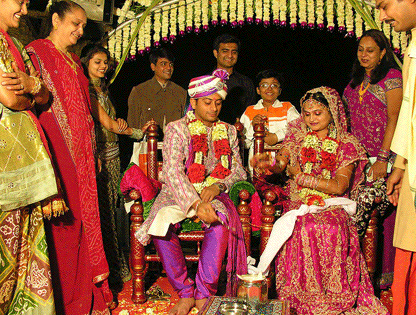
'Love and marriage, love and marriage; go together like a horse and carriage . . . "
So the old song went, though it seems its sentiments are not shared by all. Increasingly in the West, for many couples, love does not lead inevitably to marriage, while for many South Asian families, marriage is not necessarily preceded by love.
‘The word “love” doesn’t mean you are happy with the person. If it means losing my family, which is more important to me, then I wouldn’t marry someone who was not Gujarati’ (A young Gujarati).
Marriage continues to be an important institution for South Asians. For many South Asian parents, their main goal in life is to see their children educated and married, so the pressure to find a partner and settle down, which is felt the world over, can seem particularly intense for young Asians of ‘marriageable’ age.
At family gatherings, they can be faced with aunties and uncles enquiring about the current status of the marital quest, perhaps suggesting names of potential suitors. The hunt for a suitable marriage partner has provided a wealth of material for Asian filmmakers and writers alike.
Arranged Marriages
Arranged marriages are normal, but while older generations often had little or no say in their choice of spouse, sometimes only meeting on the wedding day, younger generations are far more likely to play a key role in the decision-making. Parents usually introduce prospective couples to each other, and leave it to them to make their own decisions.
Partners are sometimes found via the ‘auntie network’, a complex global movement whereby aunties pass on information about eligible young people through a string of contacts eventually reaching hopeful parents. Some parents pay professional matchmakers to do this job or use newspaper matrimonial adverts or websites.
Where couples have met independently of their parents, (sometimes using matrimonial websites or the like themselves), it is still important to get parental approval before a marriage can go ahead. The ideal marriage partner is considered to be someone from the same cultural background and social status. Some parents specify not only the race, region, religion and caste of a prospective partner, but even what village their family should come from!
There are a few interracial and inter-religious marriages and a small number of couples are choosing to cohabit instead of (or before) marrying. This is generally met with disapproval not only from the immediate families of the couple, but from their extended families too.

Forced Marriages
At the other end of the scale are tragic cases where young women in particular have been forced or duped into marriage. This is more likely to happen on the Subcontinent while they think they are holidaying. In some cases, where young women have tried to escape or avoid a forced marriage, they have been murdered in so-called honour killings to preserve the family’s reputation. There are some incidents where young men have also been targeted. These cases are rare, but forced marriage remains an issue in some South Asian communities.
Family Life
The family continues to be an important part of a couple’s life even after marriage. There are some people who see marriage as a union not only of the couple, but between their families, which is why family opinion is so important. Some newly-wed couples move in with the husband’s family. While this can be a support to the couple and even a good training ground before setting up their own household, it can also put a strain on the marriage as they seek to get to know one another under the gaze of the family. It could be particularly straining for the wife, having left her parental home to move in with not only one new person but a whole family.
Divorce
Divorce, like cohabitation, is generally disapproved of by the South Asian community. However, it is on the increase. Some feel this is down to less parental involvement in matches, where marriages are based more on attraction than ‘compatibility’. Others feel that young Asians (like the rest of society) are not willing to put effort into their marriages, so that when difficulties arise they prefer to walk away, rather than resolve them. Another reason cited is the fact that divorce is less of a taboo than it was, so women in particular feel more confident about leaving spouses, who may be violent.
Despite all these changes, marriage has not yet become unfashionable for the South Asian community. So important is this institution, that the Indian wedding season even affects the global price of gold.
South Asian Concern
Leave a Comment: